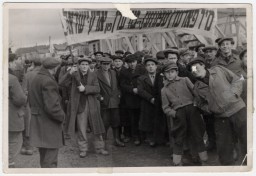<< Previous | Displaying results 6301-6350 of 6720 for "" | Next >>
-
Forced labor at a Siemens factory
PhotoPrisoners at forced labor building airplane parts at the Siemens factory in the Bobrek labor camp, a subcamp of Auschwitz. February-June 1944. David Stein is pictured in the row to the right, with his back to the camera; his brother Charles is in the same row, fourth from the left, facing the camera.
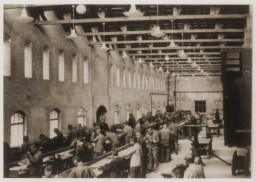
-
View of the Wannsee Villa
PhotoOn January 20, 1942, the villa was the site of the Wannsee Conference.
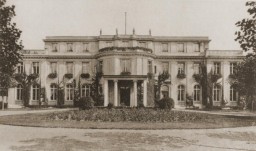
-
Group portrait of Jewish friends in Hungary
PhotoGroup portrait of Jewish friends at a swimming pool in Kalocsa, Hungary, 1930.
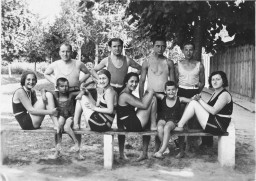
-
Rohingya in a refugee camp
PhotoRohingya walk into a section of the Balukhali refugee camp in Bangladesh, September 2017.
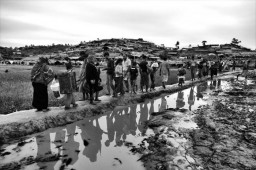
-
Soldiers swear an oath of loyalty to Hitler
PhotoIn Poznan, ethnic German recruits to the German army swear allegiance to Adolf Hitler. January 1940.
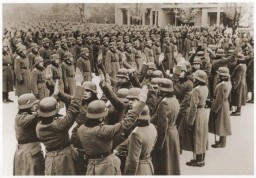
-
Military troops taken oath of loyalty
PhotoTroops take the oath of obedience to Adolf Hitler. Germany, January 1939.
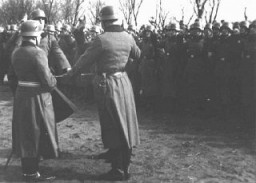
-
Poster for Nazi Party speech on Jewish Bolshevik threat
PhotoPoster for a meeting and speech about the Jewish Bolshevik threat against Germany sponsored by the local Nazi Party of East Hannover. Depicted is a silhouetted caricature of a Jewish man’s head in left profile, with a large, red Star of David beside him. The announcement at the top of the poster reads: "Victory over Bolshevism and plutocracy means being freed from the Jewish parasite!" Created ca. 1937–1940.
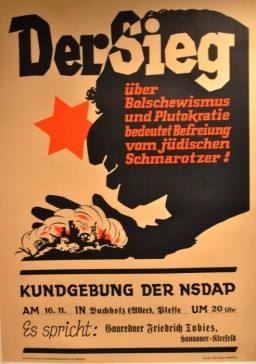
-
Disembarking from the St. Louis in Amsterdam
PhotoA Jewish refugee couple poses on the gangway of the MS St. Louis as they disembark from the ship in Antwerp. Belgium, June 17, 1939.
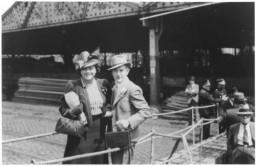
-
Yevgeny Khaldei views the destruction of Budapest
PhotoSoviet photographer Yevgeny Khaldei views the destruction of Budapest from a rooftop. Budapest, Hungary, February 1945.
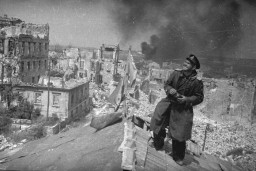
-
Yevgeny Khaldei standing on top of the Brandenburg Gate
PhotoSoviet photographer Yevgeny Khaldei stands on top of the Brandenburg Gate in Berlin where he, along with a few Soviet soldiers, raised the Soviet flag. Berlin, Germany, May 1945.
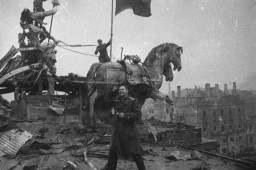
-
Unit of Soviet soldiers
PhotoA unit of Soviet soldiers walks along a narrow strip of land that juts into the water while on a reconnaissance mission in Murmansk. Photograph taken by Soviet photographer Yevgeny Khaldei. Murmansk, Soviet Union, 1941.
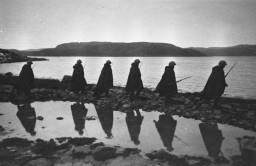
-
Soviet planes fly over Berlin
PhotoSoviet planes fly over the destroyed Reichstag (German parliament) building in Berlin. Photograph taken by Yevgeny Khaldei. Berlin, Germany, ca. April 1945.
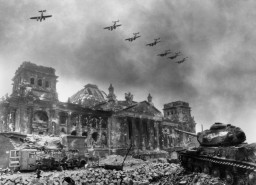
-
A Soviet soldier amidst destruction in Budapest
PhotoPortrait of a Soviet soldier standing on a heavily damaged street in Budapest. Photograph taken by Soviet photographer Yevgeny Khaldei. The location is Apponyi Square. On either side of the street are the ruins of the Clotild Palaces. In the background is the Erzsebet (Elizabeth) bridge. Budapest, Hungary, 1945.
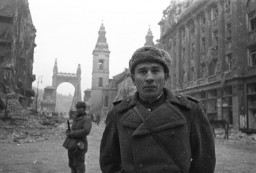
-
Soviet tanks in Vienna
PhotoSoviet tanks roll down a street in Vienna during the Soviet conquest of the Austrian capital at the end of World War II. Photograph taken by Yevgeny Khaldei. Vienna, Austria, 1945.
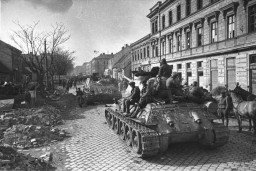
-
Two men standing in a doorway in the former Budapest ghetto
PhotoPortrait of two men standing in a doorway in the former Budapest ghetto, one of whom is wearing a painted yellow star on his jacket. Photograph taken by Yevgeny Khaldei. Budapest, Hungary, 1945.
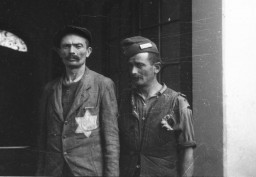
-
Scene in the destroyed city of Murmansk
PhotoA woman walks along a road past a line of chimneys in the destroyed city of Murmansk. Photograph taken by Soviet photographer Yevgeny Khaldei. Murmansk, Soviet Union, 1942.
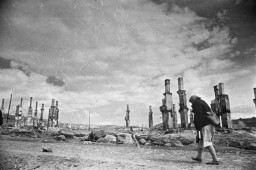
-
Soviet troops trample a Nazi flag
PhotoSoviet troops trample a Nazi flag as they march past a burning house on a street in the outskirts of Vienna. Photograph taken by Soviet photographer Yevgeny Khaldei. Vienna, Austria, April 1945.
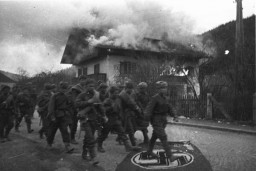
-
Telegram from Quanza Passengers to Eleanor Roosevelt
PhotoThe SS Quanza was a Portuguese ship chartered by Jewish refugees attempting to escape Nazi-dominated Europe in August 1940. Passengers with valid visas were allowed to disembark in New York and Vera Cruz, but that left 81 refugees seeking asylum. On September 10, 1940, they sent this telegram to First Lady Eleanor Roosevelt to implore her for help.
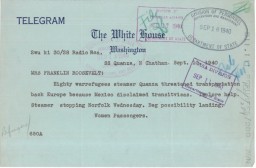
-
Card from SS Quanza Passengers to the White House
PhotoRefugee passengers of the SS Quanza sent a large bouquet of red roses and this message to First Lady Eleanor Roosevelt to thank her for her help. The First Lady made sure President Roosevelt saw both the flowers and the card, which were displayed prominently outside his bedroom.
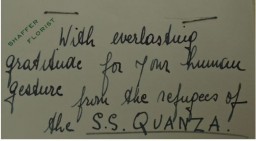
-
Passengers on the SS Quanza
PhotoPassengers on the SS Quanza while temporarily docked in Norfolk, Virginia. The Quanza was a Portuguese ship chartered by 317 Jewish refugees attempting to escape Nazi-dominated Europe in August 1940. Photo dated September 10, 1940.
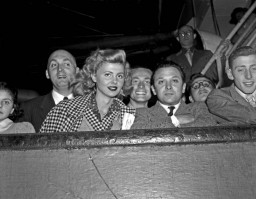
-
Nazi eugenics poster
PhotoNazi eugenics poster entitled "Feeble-mindedness in related families in four neighboring towns." This poster shows how "feeble-mindedness" and alcoholism are passed down from one couple to their four children and their families. The poster was part of a series entitled, "Erblehre und Rassenkunde" (Theory of Inheritance and Racial Hygiene), published by the Verlag für nationale Literatur (Publisher for National Literature), Stuttgart, Germany, ca. 1935.
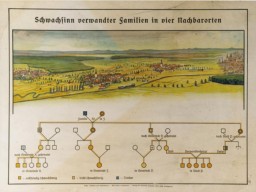
-
Propaganda slide showing the opportunity cost of feeding a person with a hereditary disease.
PhotoPropaganda slide produced by the Reich Propaganda Office showing the opportunity cost of feeding a person with a hereditary disease. The illustration shows that an entire family of healthy Germans can live for one day on the same 5.50 Reichsmarks it costs to support one ill person for the same amount of time. Dated 1936. Nazis defined individuals with mental, physical, or social disabilities as “hereditarily ill” and claimed such individuals placed both a genetic and financial burden upon society…
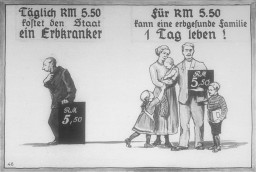
-
Scene in a camp for people displaced from Srebrenica
PhotoIn July 1995, Bosnian Serb forces killed as many as 8,000 Bosniaks from Srebrenica. It was the largest massacre in Europe since the Holocaust. This photograph shows a Bosniak woman at a makeshift camp for people displaced from Srebrenica in July 1995.
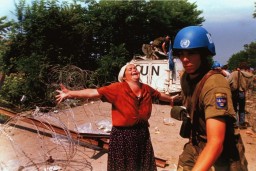
-
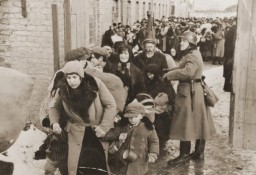
-
View of a burial site in Nyanza, Rwanda
PhotoNyanza is a site near Kigali, Rwanda, where several thousand people were executed after being marched from the Belgian Technical School in April 1994. At the school, they had been under the protection of UN peacekeepers until the soldiers were recalled to the airport to help evacuate expatriates. This is one of the few sites where victims had the honor of individual burial; most often they were buried together in large graves. Photograph taken on November 24, 2007. United States Holocaust Memorial Museum

-
Refugees Arrive in Tuzla during the Bosnian War
PhotoRefugee women and children arrive by truck in Tuzla during the Bosnian War, which lasted from 1992 to 1995. They are likely coming from Srebrenica. Photo taken in March 1993.
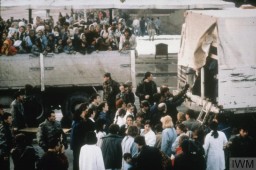
-
Twelfth Army Group Situation Map for D-Day
PhotoDated June 6, 1944, this US Twelfth Army Group situation map shows the presumed locations of Allied and Axis forces on D-Day, when Allied troops landed on the beaches of Normandy. Drafted during the war, the content in this historical map reflects the information that operational commander, General Omar N. Bradley, would have had on hand at the time.
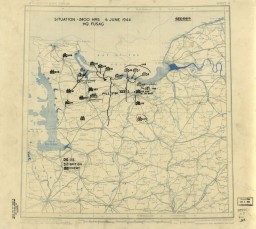
-
Canadian troops on D-Day
PhotoCanadian troops of the 'B' Company, North Shore (New Brunswick) Regiment take cover on June 6, 1944, or D-Day.
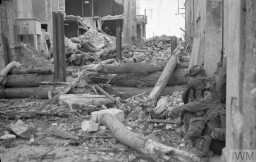
-
British Troops Prepare for the Allied Invasion of Normandy
PhotoCaptain Lasdun briefs troops of the British Army on June 4, 1944, two days before the Allied invasion of Normandy on D-Day.
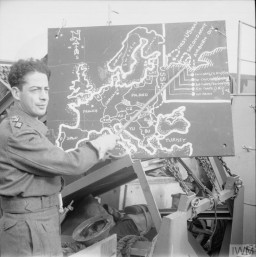
-
Salek Liwer with friends at the Bad Gastein displaced persons camp
PhotoSalek Liwer (center) with friends at a Dror Zionist youth movement seminar in the Bad Gastein displaced persons camp in Austria, 1946.
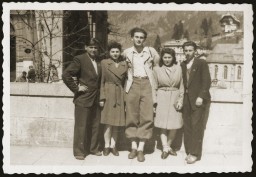
-
David Bromberg poses at the Ebensee displaced persons camp
PhotoJewish DP David Bromberg poses at the entrance to a barrack in the Ebensee displaced persons camp on October 30, 1946.
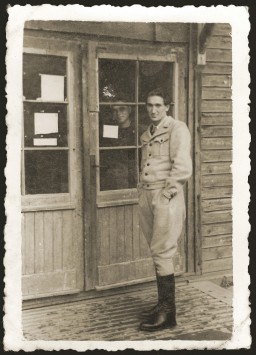
-
View of the Rothschild Hospital DP Center
PhotoAfter World War II, the Rothschild hospital in Austria was primarily concerned with the rehabilitation of sick displaced persons. It also served as a lager for political prisoners and as a hostel for 600 refugees.
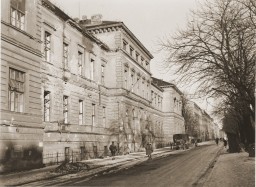
-
Jewish DPs at the Rothschild Hospital
PhotoJewish DPs (displaced persons) celebrate at a banquet at the Rothschild Hospital DP center.
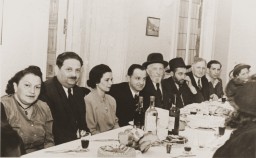
-
Jewish DPs from the New Palestine displaced persons camp gather around a memorial
PhotoJewish DPs from the New Palestine displaced persons camp in Salzburg, Austria, gather around a memorial dedicated to the Jewish victims of the Nazis. Among those pictured is Moniek Rozen (third from the left), Kazik Szancer (fourth from the left) and Rela Szancer (fifth from the left).
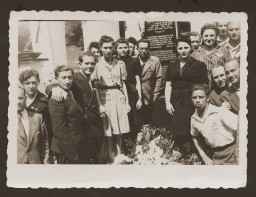
-
DPs In front of the Düppel Center Displaced Persons Camp
PhotoDisplaced persons (DPs), Lusia Gliklich (left) and Andzia Dell, stand beside the sign in front of the Düppel Center DP camp, also called Schlachtensee.
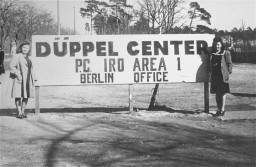
-
School Report Card Issued in a DP Camp
PhotoThis report card was issued to Regina Laks, a fifth-grade student at the Herzel Hebrew Public School at the Düppel Center displaced persons camp.
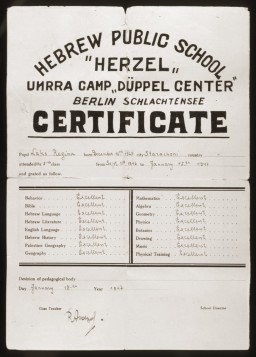
-
Fürth Displaced Persons Camp Identity Card
PhotoThis identity card was issued to Henryk Lanceter at the Fürth Displaced Persons Camp in Germany.
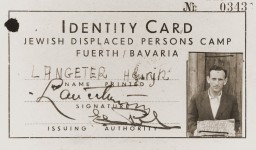
-
ID Card for a Jewish DP camp resident
PhotoThis identification card was issued to Sima Wajner, a Jewish resident of the Heidenheim displaced persons camp. The card identifies her as a former concentration camp inmate who had been imprisoned in the Stuffhof camp during the Holocaust. Card dated January 23, 1947.
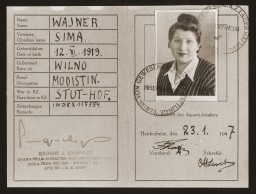
-
Group portrait at the Heidenheim DP camp
PhotoJewish displaced persons (DPs) and American soldiers at the Heidenheim DP camp, circa 1946–1947. Leon Kliot (Klott) is standing on the far right, third from the top.
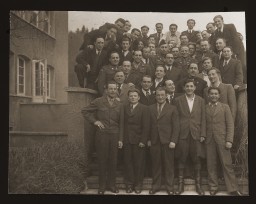
-
Jewish displaced persons in the Lampertheim DP camp
PhotoYoung Jewish displaced persons (DPs) on a street in the Lampertheim DP camp, circa 1946–1948.
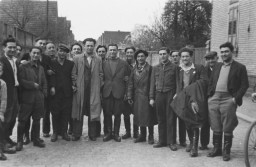
-
Jewish displaced persons in the Leipheim DP camp
PhotoGroup portrait of Jewish displaced persons (DPs) in the Leipheim DP camp. From left to right are an unidentified couple, Rubin Kaplan, Zalman Kaplan (cousin), Dwora (cousin) and her husband Eli Flaks, and their infant, Pearl.
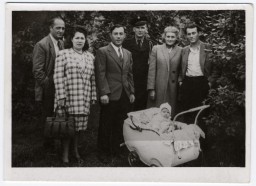
-
Bialik kindergarten class in the Mariendorf DP camp
PhotoBialik kindergarten students pose together in the Mariendorf displaced persons (DP) camp, circa 1946–1948. The children hold a banner that reads, "Ch, N. Bialik Kindergarten." A portrait of Theodor Herzl hangs on the back wall. Above the portrait is is a Hebrew banner that reads "Our children, the future of our nation." Benjamin Markowicz is in the fourth row, second from the left.
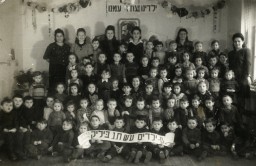
-
View of the Mariendorf-Bialik DP Center
PhotoView of the Mariendorf displaced persons (DP) in Berlin, Germany, 1946–1948.
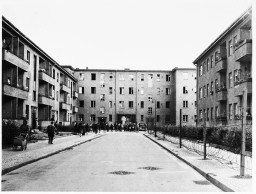
-
Displaced Persons at the Neu Freimann DP camp
PhotoJewish displaced persons (DPs) converse on the streets of the Neu Freimann DP camp, circa 1946–1948.The photographer, Jack Sutin, lived at the camp with his family and worked as a camp administrator and photojournalist.
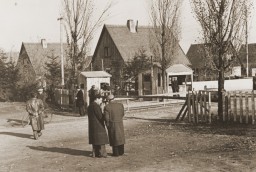
-
Dental Technicians at the Neu Freimann DP camp
PhotoDental technicians prepare molds at the Neu Freimann displaced persons (DP) camp, circa 1945–1949. Neu Freimann had its own dental treatment facility. The photographer, Jack Sutin, lived at the camp with his family and worked as a camp administrator and photojournalist.
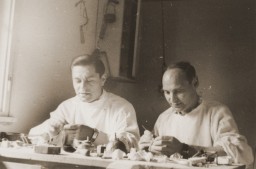
-
Young children in the Stuttgart displaced persons camp
PhotoElementary school-age members of Hashomer Hatzair in the Stuttgart displaced persons camp, circa 1946–1949. Lova Warszawczyk is standing in the center.
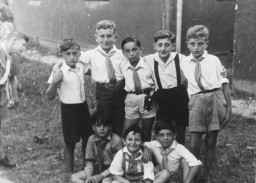
-
In Front of the Stuttgart West Displaced Persons Camp
PhotoHenry Brauner (center) with his wife, Esther (second from right), pose with three friends in front of the entrance to the Stuttgart West displaced persons (DP) camp, 1945.
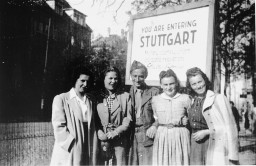
-
Housing at the Wetzlar Displaced Persons Camp
PhotoA view of the housing for Jewish displaced persons (DPs) at the Wetzlar DP camp in Germany, September 9, 1948.
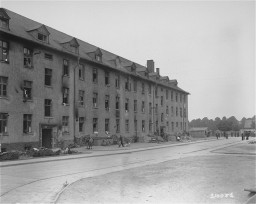
-
A Meeting at the Wetzlar DP Camp
PhotoLeaders at the Wetzlar displaced persons (DP) camp hold a meeting to discuss current happenings and improvements for the camp, September 9, 1948.
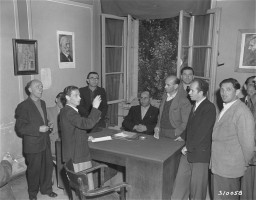
-
Men demonstrate in the Ziegenhain displaced persons camp
PhotoMen in the Ziegenhain displaced persons (DP) camp demonstrate on behalf of free immigration to Palestine, circa 1945 1948. Their banner expresses their wish to go to Israel.
